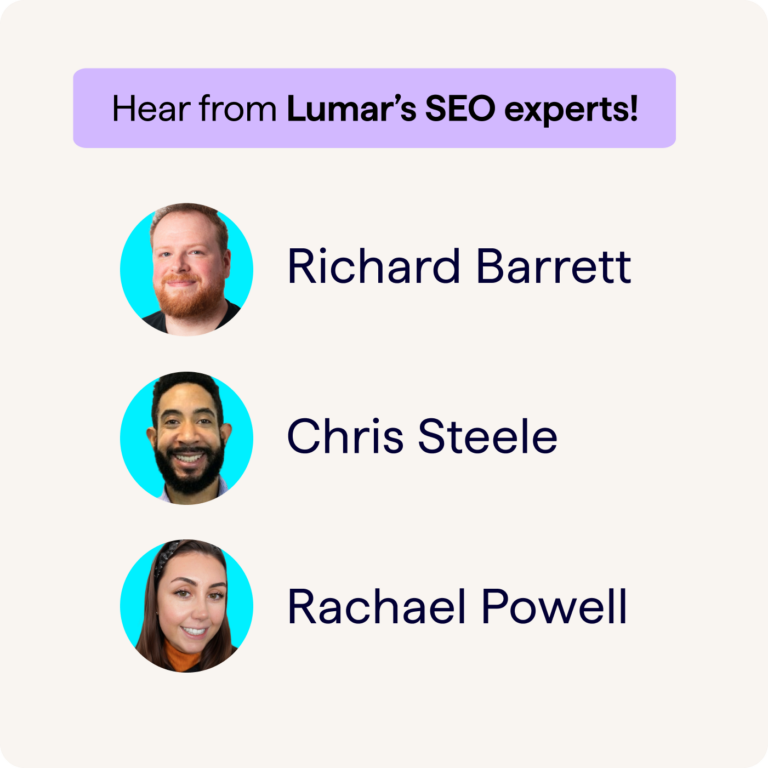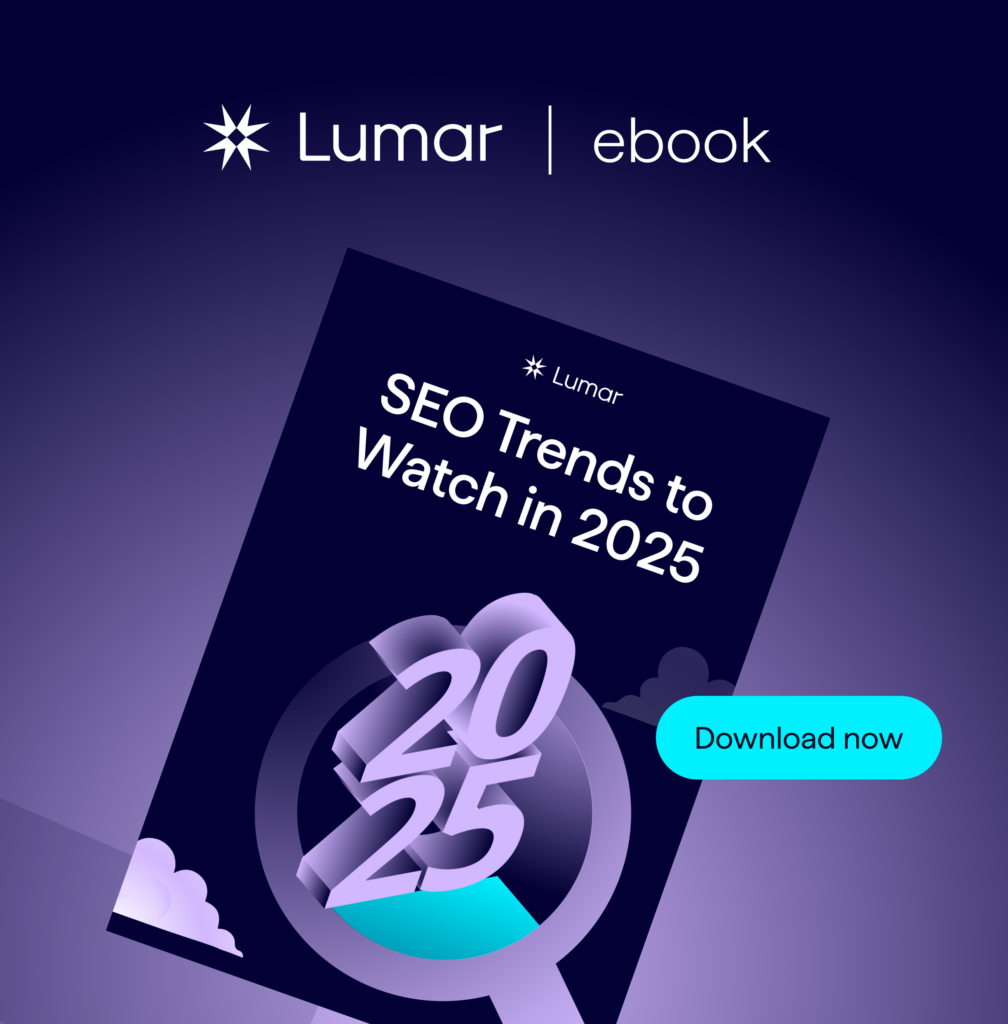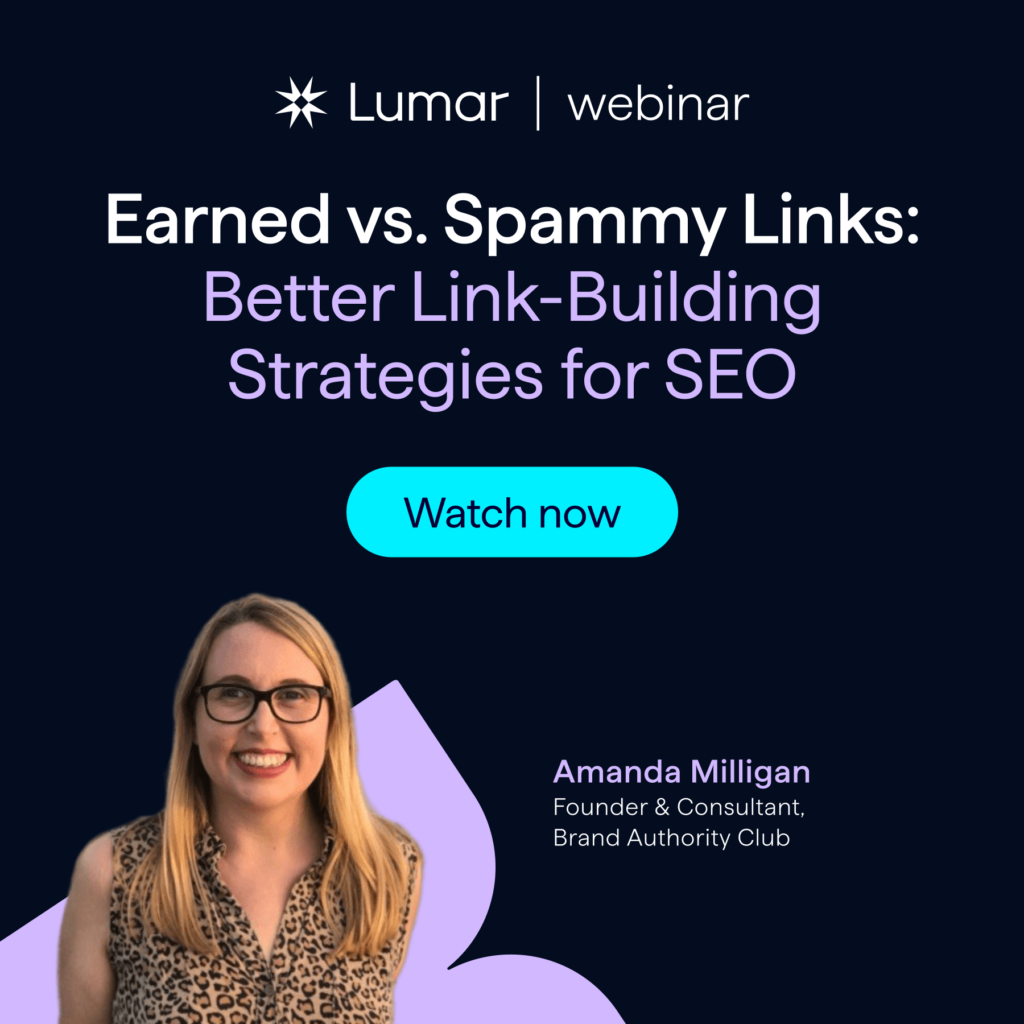Watch Now: SEO Strategies for 2025
Join senior technical SEO pros from Lumar’s Professional Services Team for this session on how SEO is changing in 2025 — and how you can update your SEO strategy to stay ahead in the search rankings this year.
In this session, we cover:
- How AI is changing search
- New search engine competitors
- Content quality and increased scrutiny of spammy content
- Structured data / schema markup
- User-focused website optimization
Watch the entire webinar session (including Q&A portion) on-demand above — or download our companion eBook, “SEO Trends to Watch in 2025,” for even more insights on how SEO is changing this year.
Get the companion eBook: 2025 SEO Trends
Webinar Recap: SEO Strategies for 2025
AI in search
There’s no doubt about it, AI is shaking up the whole online search landscape.
“It’s just been such an advancement in how we search online,” Rachael Powell says, “With tools like ChatGPT and Perplexity, they offer such a different experience when we search.”
“I feel like it’s for us [as SEOs] to figure out how to best serve the content we want to provide so that, as well as being found high-up in the Google SERPs, how do we also provide content so that AI tools can easily scrape it and serve that content to users also?”
“It’s shaken up the whole landscape and what we’ve done in the past,” agrees Chris Steele, “We’re now talking about shifting from standard search results and SERP features to generative engine optimization [GEO], AI-augmented SERP features.”
“Before, positioning [in Google rankings] was the ultimate scoreboard for SEO performance, and now I think it’s probably going to shift to broader visibility [across all platforms].”
“There are two main things that stick out to me in terms of AI and search,” says Richard Barrett, “One is that we can’t really track the impact of it at the moment. I’m hoping that changes in the future. We get some impressions data, some click data, as well as referrals — it’d be great to know what the person typed in to get there and what the AI ‘thought’ of that.”
“But there’s also how AI ties in with how SEO currently works,” continues Barrett, “The way that [AI platforms] are digesting information is very similar to how Google has always digested information. They crawl the pages, find the links, build out their models and the more complex stuff on the backend. But they built out these entities, then they ‘understand’ them and return it to users.”
“So there’s a great position for SEOs here,” explains Barrett. SEOs already understand how search works, they are well-positioned to also understand how to optimize for inclusion in AI outputs and broader, platform-agnostic visibility.
Because AI and LLMs used for search have a more conversational style user journey, Powell suggests SEOs ask themselves: “How do we cater to a more conversational search intent? And how can we provide results that AIs can scrape when they are having that kind of more conversational experience with the user?”
“A lot of it is understanding where LLMs are gathering their data, how they are learning, and what data they are being fed to generate responses,” says Steele. “And we don’t really know for certain where all the information is coming from — we have ideas, we have theories, but we don’t have certainty about how LLMs are grabbing data precisely.”

“I do think, down the road, we’re going to see a shift in strategy. I think SEOs are going to focus more on what they should have been focusing on the whole time — better, people-focused content, how we mark up pages, keeping our technical SEO clean. It’s more of the same, but I think there are higher stakes for doing those things now.”
— Chris Steele, Senior Technical SEO, Lumar Pro Services
“It’s an interesting point about higher stakes,” agrees Barrett, “You’re right: there’s more being impacted [by SEOs’ efforts] now.”
New search engine competitors
Recently, Google’s market share has dropped slightly: in January 2025, Google’s search market share dropped below 90% for the first time since 2025, according to StatCounter. It currently stands at 89.73%.
Steele points to the growth of AI platforms and tools like Perplexity or OpenAI’s recent release of SearchGPT as part of the reason for this drop in Google’s dominance, as well as the continued proliferation of people searching for information on social media platforms.
“I think we’re going to see more AI-based SERP features, I think we’re going to see more competitors in search,” says Steele, “We’re at the edge of it now — it’s just now starting to change and it’s going to continue to shift and change, I believe.”
Powell notes that while SEOs may want their content to be scraped by AI bots for inclusion in their generative results to boost brand awareness and visibility, we also need to think about how to combat a potential decline in click-through rates that land users on our websites, where they can convert.
Barrett points to the pressure Google is under – both with keeping up with AI competitors but also with mounting legal struggles like a monopoly ruling in the US.
“If [Google] didn’t think AI was a big deal, they wouldn’t have done anything with it. And they certainly wouldn’t have injected it so early into the search results,” says Barrett, “So, they’re coming under a lot of pressure. And if they don’t respond to that pressure, if they just carry on as they go, I think we will see them decline a little bit. I’m not saying they’re suddenly going to become the second-place search engine or anything like that, but I think their market share may continue to decline — which is not something we’ve ever really seen before. I think, gosh, since I’ve been working, Google has just been constantly growing. It would be interesting to see if someone can pick up some of that extra [market share].”
Content quality & increased scrutiny
In recent months, Google has increased its scrutiny on poor-quality content, pushing to surface more high-quality content to the top of the SERPs. This has been evident in more aggressive updates to Google’s spam policies last year, including a crackdown on “site reputation abuse” (aka “parasite SEO”).
“With the prevalence of AI, people have the ability to create hundreds of thousands of things like fake reviews and it’s easier to potentially build up a toxic backlink profile for a site, and that’s something that has to be really thought about,” says Powell.
“Obviously, Google’s focus is on trust signals — and with things like user reviews, that’s a big trust signal. Author credentials also come to mind here. Google has made a big point that they want content that is authoritative and they prefer content that is written by somebody who understands what they’re talking about and has good credentials over someone who has just used AI to put something together that’s been scraped from the internet.”
“Particularly with ‘Your Money or Your Life’ (YMYL) search results, that’s something they’re getting very strict with,” adds Barrett.
The question for SEOs is how to set the legit, authoritative content apart from AI-generated lower-quality stuff.
“With the site reputation abuse penalties we’ve seen handed out to some very large sites, the Helpful Content Updates rolling out the previous year, things like that… Usually, in the past, Google kind of masked what their focus is or what the key to ranking is — but they’re letting us know right now that quality content written by authoritative entities or people is what they’re going to value right now. In no way, shape, or form have they hidden the fact that, if you are a site that creates quality content, if you have a positive brand identity and reputation, you will do well,” says Steele.
“I think we’re gonna see a shift. Companies that have the team, the scale, and the budget to write massive amounts of content every year and just pump out content all the time are going to have to rethink the strategy and they’re going to have to focus on maybe re-optimizing content that was successful in the past, or doubling down on content topics that were successful in the past vs. just focusing on the scale of content production and saying ‘just put out as much as we can.’,” Steele continues. “I think that’s what the site reputation abuse penalties told us; you can’t have third-party entities writing content under your domain and have it be okay. It hit a lot of really big names that we thought maybe were above being penalized or algorithmically being filtered out. No one’s above this and no one can really escape it.”
Already, these spam policy updates are having an influence on how publishers approach their SEO content. In December, The Verge reported that Forbes started cutting ties with third-party writers in response to Google’s recent crackdown on “site reputation abuse” (aka “parasite SEO”).
It’s worth noting that just because you use generative AI tools to help produce your content doesn’t mean that you’ll fail to rank in Google. It’s about maintaining content quality, regardless of your production methods – this means employing fact-checkers and experts with firsthand understanding of the topics you’re creating content around.
“In terms of the AI generation aspect of content,” Barrett adds, “Google has indicated — in fact, I think they’ve outright said — that they don’t care if it’s generated by AI, they care that it’s good, they care that it’s quality content.”
(Note: You can learn more about creating content with AI responsibly in our article, “SEO Trends: Be Smart About Artificial Intelligence & AI-Generated Content.”)
Quality assurance is also key for building backlinks, Powell reminds us. “[Search engines’ focus on quality] increases the importance of quality backlinks being built from sites that are relevant to the content and that have a high domain authority,” she says.
Structured data and schema markup
SEOs already use structured data to improve how their content appears in the SERPs. Now, there’s also an ongoing debate in the SEO world about whether or not using structured data (aka schema markup) on your content can impact AI tools’ understanding and delivery of your content.
“One thing to note with LLMs — and any bot, I suppose — is that they are robots. They have parameters; they understand things by picking them out and categorizing them in information. If you used structured data and schema, then essentially what you’re doing there is saying, ‘this is the category I want this data to be in.’ It makes it easier for them,” explains Barrett.
“I tend to agree,” Says Steele, “I’ve heard both sides of this argument. One is that putting structured data or schema in place can help a bot understand and define what your content is about. But then there’s an argument to be made that LLMs can do this without structured data.”
“But my thing is like, if you’ve leaned in, if you’ve gone to the side of, ‘I want this content to show up in AI-augmented search results / SearchGPT / Perplexity,’ then I think it can’t hurt, right?”
“With structured data, you’re kind of creating your own focus point and swim lane for how you want your content to be classified, what you want to be the main point, and what you want something scraping your content to take away from it,” Steele continues.
Powell and Barrett muse about whether or not AI platforms may eventually develop their own types of structured data, designed to help LLMs understand the content they scrape.
“I think it’s going to be very interesting as well to see whether structured data may adapt to help power those more conversational [AI] queries that we spoke about earlier,” says Powell, “Are we going to get new types of structured data to help with that?”
“You make an interesting point there,” adds Barrett, “Because Google has driven a lot of the adoption of new structured data, in the sense that, you know, when they announced they were adding Review schema into the SERP, everybody rushed to put the review schema in place. And then the Author schema, everyone’s rushing to put this on. And the same applies for prices, and marking whether or not a product is on sale, et cetera.”
“So, at the moment, you have Google driving schema adoption. But if SearchGPT or one of the other competitors gets big enough, are they going to start driving their own markup that they want on content? Are people then going to say, ‘Well, hold on, I want these AI features, so I’m going to use SearchGPT’s schema’? I think it’s likely. If there’s a benefit to it, then that’s what we chase as SEOs; we look for the little 1% extra all the time that we can keep adding and adding and adding [to drive results].”
“I think you’re right, Rich,” agrees Steele, “When Product Variant schema came out, I can’t tell you how many e-commerce sites came and said, ‘Hey, should I implement this? Can we have a use case for how this is going to show up and how it’s going to help?’”
“I think we may see the same thing for generative engine optimization (GEO) and AI-augmented SERP features if they say, ‘Hey, we’re going to have our own markup structure.’,” says Steele.
User-focused website optimization
“If you don’t think about the users, are you really doing SEO, or are you just getting more traffic?”
— Richard Barrett, Head of SEO Pro Services at Lumar
“The whole point of SEO is to get the users on the site so that they do something you want them to do,” says Barrett. “So if you don’t think about the users, are you really doing SEO, or are you just getting more traffic?”
“I think user experience is something that should have been a focus for SEO the whole time — and now it has to be the focus,” Steele says.
“At the end of the day, if you’re an e-commerce site and you show up in an AI Overview, okay, fine! But you still have a product that someone has to click a link to, go to your site, and purchase.”
“You’re going to have to adapt how you present and create your content. If your content answers simple questions, those are going to be zero-click features that might show up in search results but possibly no one’s going to click through to your site.”
“I think there’s also a growing emphasis on inclusivity, and ensuring websites are accessible to everyone is so important,” adds Powell. “We should be looking at things like how to use ARIA labels and how to make our site viewable, our content readable by everyone who accesses the internet.”

Meet the Webinar Speakers
- Rachael Powell, Senior Technical SEO, Lumar
- Chris Steele, Senior Technical SEO, Lumar
- Richard Barrett, Head of SEO Professional Services at Lumar
Don’t miss the next Lumar webinar!
Sign up for our newsletter below to be alerted about upcoming webinars, or give us a follow on LinkedIn or Twitter/X to stay up-to-date with all the latest news in website optimization.
Want even more on-demand SEO webinars? Explore the full library of Lumar SEO webinar content.






